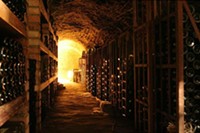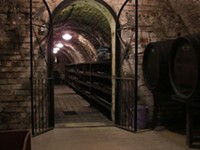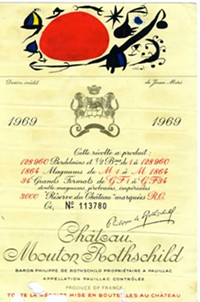Dave Nelson is the author of the blog Beer, Wine and Whisky. He writes about wine for Gut Check every Tuesday.
Aging wine at home is something everyone should attempt. You don't need a cellar. In fact, I hesitate to use the term "cellar" because it carries so many preconceptions. People tend to think of the dusty dungeon-esque catacombs beneath a stately European manse or the large, expensive wine fridges that populate the ads of wine magazines. Both images are misleading. Aging wine doesn't require a large investment, nor is the enjoyment of aged wine limited to the wealthy.
Honestly, most people don't keep wine around long. The latest stats show that 98% of all wine purchased in the United States is consumed within two days. I absolutely understand: Wine is a food product, after all, and for many only a occasional purchase. What's more, the bulk of wine in the market is produced to be consumed immediately. Still, a significant number of wines that can improve with age are available.
Of course, improve is a very subjective word in this context. There may be some consensus with regard to the evolution of a particular wine from a particular year, but the only thing an older wine is sure to be is older.
(Well, in most cases.)
As it ages, wine goes under a number of complex -- and not particularly
well-understood -- chemical changes. As temperature increases so does
the rate at which chemical reactions occur. Thus, the warmer the place
you are storing the wine, the quicker it will age in the chemical
sense. And since these chemical reactions are what causes the flavors
and aromas to change, it's this chemical "age" we are really concerned
with.
Which brings us to the single biggest obstacle to aging wine at home.
The traditional temperature cited as ideal for aging wine is a constant 55 F. Absent a castle, an expensive specialty wine fridge or a custom-built home wine cellar, this is hard for most folks to achieve. But all is not lost. "Ideal" doesn't equal necessary. More important is being cognizant of what the temperatures of your storage spaces are, and learning how that impacts your attempts at aging.
Now, it's not quite as simple as doing a bit of arithmetic (or even algebra) to figure out how much more quickly your particular storage conditions will "age" a wine. There are many reactions involved, and increased temperature will have a different impact on each of them. In addition, some reactions will lead to flavors and aromas you will find pleasant, while others will lead to results you won't enjoy. So what can you do?
I heartily recommend guilt-free experimentation.
First, a couple of caveats before you begin. Most importantly, know that not all of your experiments will work out positively. In fact, some will go horrifically wrong. Relax, accept this inevitability, and be prepared to learn from it. And by learn from it, I mean write things down. It doesn't need to be flowery tasting notes; simple statements of what worked and what didn't should be enough to avoid repeating mistakes.
Next, learning how to age wines and what wines you find worth aging will take some time. Even under the sub-optimal conditions that likely exist in your house, this will be a matter of years, not weeks or months. I strongly suggest aging wine on a small-scale basis until you get both your palate and the impact of your space tuned in.
Really, two or three bottles of each wine to be sampled at yearly or greater intervals are enough at the beginning. And you don't need to buy twelve different Bordeaux or California pinot noirs. Try a couple, making sure to get examples from different vintages (and not just "the best" vintages, either). It's no fun drinking through a case of wine that's over the hill or no longer to your taste. Trust me.
If you don't have a clue what sort of wines might improve with age, ask your wine merchant, or drop me a comment or an e-mail. If there's enough interest, I can share my experiences in another post.
You can also cut short (somewhat) the process of figuring out what wines are worth aging by picking up older wines at auction or from specialty retailers to see what flavors and aromas appeal to you.
In my house, wines are aged in what used to be the coal storage room. Nicely situated in the northwest corner of my basement, this ranges from 57 F to 64 F or so over the course of the year. I've been aging wine here for over a decade now, so I've finally got a good feel for how the wines I like age under these circumstances, and I'm very pleased with the results.
So find the coolest place in your home that is also dark -- exposing wine to light causes problems, too -- and start there. If you've got multiple spaces that might work, steady cool is better than cold in the winter and hot in summer. If you don't have any place that's cool enough, or you simply have the money to spend, a small specialty wine refrigerator works well, as does temperature-controlled off-site storage. Then, hit your favorite wine retailer to grab a few victims, and wait.
- Local St. Louis
- News
- Things to Do
- Arts & Culture
- Food & Drink
- Music
- Movies
- St. Louis in Pictures
- About Riverfront Times
- About Us
- Advertise
- Contact Us
- Jobs
- Big Lou Holdings, LLC
- Cincinnati CityBeat
- Louisville Leo Weekly
- Detroit Metro Times
- St. Louis Riverfront Times
- Sauce Magazine





